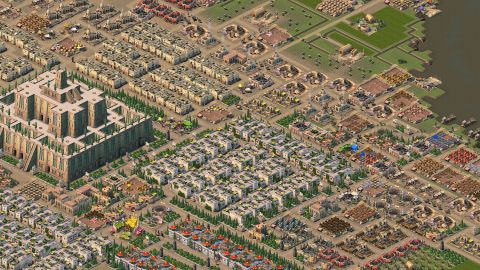Our Verdict
Classically styled and rich in detail, Nebuchadnezzar's city-building fun is hindered by micromanagement and trading issues.
PC Gamer's got your back
What is it? A retro styled city builder.
Expect to pay TBA
Release February 17, 2021
Developer Nepos Games
Publisher Nepos Games
Reviewed on AMD Ryzen 5 3600, Nvidia GeForce 2080 Super, 32 GB RAM
Multiplayer? No
Link Official site
A city-building throwback that throws players all the way back to the cradle of civilisation, Nebuchadnezzar arouses fond memories of games like Caesar III and, to a lesser extent, Age of Empires. Its classical style both looks and sounds great, while its systems delve considerably deeper than what is apparent on the surface. Unfortunately, as Nebuchadnezzar grows in scope, it becomes increasingly burdened by micromanagement, while a couple of significant design flaws threaten to sink the whole enterprise.
Set in ancient Mesopotamia, Nebuchadnezzar's campaign tasks you with building some of the world's oldest and greatest cities—Ur, Nineveh, Babylon, etc. Guided by Gilgamesh through the game's four introductory missions, the remaining nine levels involve constructing thriving metropoli, capping each one off with a great wonder such as Ashurbanipal's Library, the Hanging Gardens of Babylon, or your own custom-designed temple complex.
Nebuchadnezzar's primary achievement is how it captures the feeling and atmosphere of the games it is so clearly inspired by. The soundtrack has that nigh-mystical quality to it that helped to make Age of Empires such an absorbing experience, while the pixel-art has the same granular eye for detail as Caesar III and Pharaoh, from the smoke that billows from the chimneys of your bakeries, to the tiny goats that surround your livestock farms.
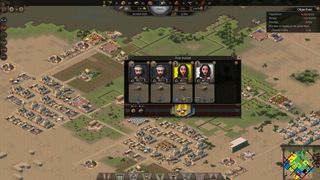
You'd be forgiven for thinking that, stylistically, Nebuchadnezzar looks a tad dry in screenshots. But it's a different experience entirely in motion. Even a small town hums with activity. Farmers scatter seeds across their fields in the spring and gather crops into bushels at harvest time. Caravans ferry goods to warehouses bursting with fish and dates and ale, while market vendors wander the streets carrying baskets filled with bread and balancing water jugs on their heads. As your city expands, its buildings evolve and grow with it, with hordes of new settlers flooding the streets in a scramble to inhabit your snazzy new abodes.
Establishing a city involves mastering logistics and production chains
Like most city-building games, Nebuchadnezzar isn't simply about creating a nice-looking metropolis. Establishing a city involves mastering logistics and production chains, as well as catering to the ever-increasing demands of your populace. There are three different classes of citizen, each of which lives in a different building type that also has multiple stages of evolution. Regular workers will begrudgingly reside in a half-finished hovel. But supplying these houses with bread and milk will upgrade the house, enabling more workers to live in it.
Supplying a house like this is itself the culmination of a chain of different processes. To supply bread, one of the most basic resources, you need a crop farm to produce the wheat, a bakery within range of the farm to turn that wheat into a delicious loaf, and a poor market within range of the bakery to sell that bread to local houses. Citizens won't just rock up at the market automatically either. You must establish localised sales routes through individual neighbourhoods, at which point your market vendors will take the bread, milk, etc to the houses.
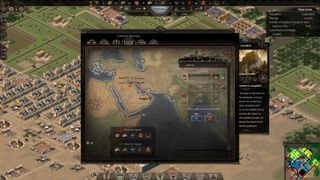
It's basically bronze-age Deliveroo, which is somewhat counter-intuitive, but falls in line with Nebuchadnezzar's general emphasis on logistics. As your city grows, warehouses and caravans become crucial to effective distribution of resources. The former can be tailored to store specific amounts of items, while the latter are used to transport items from one warehouse to another.
Developer Nepos games does an impressive job of baking variety into the cityscape. Over the course of your game you'll build butchers, carpenters, coppersmiths, breweries, wineries, tablet-makers (the writing kind, not the paracetamol kind), and many other building types, all of which require different resources that must be individually produced, transported, and distributed accordingly. In addition to this more pragmatic side of urban planning, your cities also showcase the prestige of both your ruler and your populace. Some citizens will only reside in your city if their potential home reaches a certain prestige level, increased by placing decorations.
You, meanwhile, can increase the prestige level of the city in general by constructing monuments. To this end, Nebuchadnezzar features a purpose-built monument designer that lets you construct your temple, gardens or whatever, building up floors, refining its look by placing doors and staircases, and even decorating with tiny trees, vases, braziers and so on. Monuments require a huge resource investment to construct, however, so the process is one of chipping away at it over the latter half of your game, rather than building the entire edifice in one fell swoop.
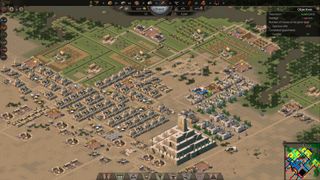
In its opening missions, Nebuchadnezzar seems like an ideal chillout experience, one to while away an evening building districts and watching the general hubbub of your city unfold. Unfortunately, the deeper you delve into the game, the more stressful and frustrating the experience becomes.
There are several key issues, the first of which is that establishing distribution routes for your market vendors becomes a chore in any largeish settlement. Not only must you establish a new route for every vendor in the city (averaging out at three per market), you'll also have to alter the route whenever you add buildings to that area, which you do constantly.
The deeper you delve into the game, the more stressful and frustrating the experience becomes
More broadly, it can be difficult to identify problems within your production chain. Sometimes you'll set a vendor to serve a neighbourhood, but not all the houses in that neighbourhood will receive the goods you want them to. Is this because the vendor has run out of produce during their rounds? Or is it because they aren't getting sufficient goods from the warehouse in the first place? It's often hard to tell. In another example, I had a warehouse overflowing with beer, but the nearby markets simply would not distribute it, no matter what I did. The consequences for a break in your production chain can be severe too. At one point, a single warehouse in my city became overstuffed with bread and could no longer accept milk. Within five minutes my working classes had almost completely abandoned the city, a problem that took half an hour to rectify.
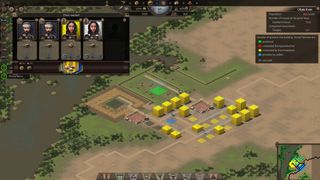
Nebuchadnezzar's biggest issue, however, has to do with trade. You can only construct new buildings by spending gold, and gold is earned only through trading with other cities. This is fine, except these cities will only deign to trade with you once you reach a certain prestige level, and even then, you have to butter them up with a (usually substantial) gift first. Because of these significant initial demands, it's entirely possible to build yourself into a corner, where you run out of money and cannot earn any more. You can get money back by destroying buildings, but this offers diminishing returns, providing little opportunity to rebuild if you make mistakes. This means early errors in city-planning are not just annoying, but potentially fatal to your game.
I like a lot of what Nebuchadnezzar does, from its wonderful presentation to its highly dynamic city simulation. But the core systems are currently too stern and austere compared to the payoff of successfully building your city. Similar games like Anno 1800 and Dyson Sphere Program offer grander, more spectacular rewards with fewer frustrations. Nebuchadnezzar isn't lacking for class, but needs to dial up the fun factor.
Classically styled and rich in detail, Nebuchadnezzar's city-building fun is hindered by micromanagement and trading issues.
